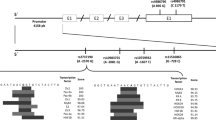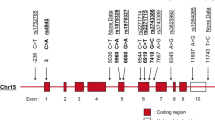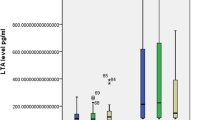Abstract
Innate differences in tumour necrosis factor (TNF) production have been associated with susceptibility for and outcome of inflammatory diseases. Several studies have tried to identify whether polymorphisms in or near the TNF gene or other markers on the short arm of chromosome 6 (6p21) are related to differences in TNF production. Data on these associations are conflicting. Therefore, we conducted a study among 129 healthy individuals in which TNF production was determined upon stimulation with endotoxin in whole blood cultures. TNFa microsatellite, TNF single nucleotide polymorphisms at position +489, −238, −308 and −376 typing was performed. The data revealed that alleles of TNFa microsatellite and carriership of TNF polymorphisms were not related to TNF production. We conclude that the genes determing the differences in endotoxin-induced TNF production have not been yet identified.
This is a preview of subscription content, access via your institution
Access options
Subscribe to this journal
Receive 6 digital issues and online access to articles
$119.00 per year
only $19.83 per issue
Buy this article
- Purchase on Springer Link
- Instant access to full article PDF
Prices may be subject to local taxes which are calculated during checkout


Similar content being viewed by others
References
Beutler BA . The role of tumor necrosis factor in health and disease J Rheumatol 1999 26 (Suppl 57): 16–21
Tracey KJ, Cerami A . Tumor necrosis factor: a pleiotropic cytokine and therapeutic target Annu Rev Med 1994 45: 491–503
Vassalli P . The pathophysiology of tumor necrosis factors Annu Rev Immunol 1992 10: 411–452
Targan SR, Hanauer SB, van Deventer SJ et al. A short-term study of chimeric monoclonal antibody cA2 to tumor necrosis factor alpha for Crohn’s disease. Crohn’s Disease cA2 Study Group N Engl J Med 1997 337: 1029–1035
Maini RN, Taylor PC, Paleolog E et al. Anti-tumour necrosis factor specific antibody (infliximab) treatment provides insights into the pathophysiology of rheumatoid arthritis Ann Rheum Dis 1999 58 (Suppl 1): I56–I60
The MHC sequencing consortium. Complete sequence and gene map of a human major histocompatibility complex. The MHC sequencing consortium Nature 1999 40: 921–923
Pociot F, Briant L, Jongeneel CV et al. Association of tumor necrosis factor (TNF) and class II major histocompatibility complex alleles with the secretion of TNF-alpha and TNF-beta by human mononuclear cells: a possible link to insulin- dependent diabetes mellitus Eur J Immunol 1993 23: 224–231
Wilson AG, di Giovine FS, Blakemore AI, Duff GW . Single base polymorphism in the human tumour necrosis factor alpha (TNF alpha) gene detectable by NcoI restriction of PCR product Hum Mol Genet 1992 1: 353
D’Alfonso S, Richiardi PM . An intragenic polymorphism in the human tumor necrosis factor alpha (TNFA) chain-encoding gene Immunogenetics 1996 44: 321–322
Zimmerman PA, Guderian RH, Nutman TB . A new TNFA promoter allele identified in South American Blacks Immunogenetics 1996 44: 485–486
D’Alfonso S, Richiardi PM . A polymorphic variation in a putative regulation box of the TNFA promoter region Immunogenetics 1994 39: 150–154
Higuchi T, Seki N, Kamizono S et al. Polymorphism of the 5′-flanking region of the human tumor necrosis factor (TNF)-alpha gene in Japanese Tissue Antigens 1998 51: 605–612
Brinkman BM, Giphart MJ, Verhoef A et al. Tumor necrosis factor alpha-308 gene variants in relation to major histocompatibility complex alleles and Felty’s syndrome Hum Immunol 1994 41: 259–266
Hamann A, Mantzoros C, Vidal-Puig A, Flier JS . Genetic variability in the TNF-alpha promoter is not associated with type II diabetes mellitus (NIDDM) Biochem Biophys Res Commun 1995 211: 833–839
Allen RD . Polymorphism of the human TNF-alpha promoter–random variation or functional diversity? Mol Immunol 1999 36: 1017–1027
Uglialoro AM, Turbay D, Pesavento PA et al. Identification of three new single nucleotide polymorphisms in the human tumor necrosis factor-alpha gene promoter Tissue Antigens 1998 52: 359–367
Brinkman BM, Kaijzel EL, Huizinga TW, Giphart MJ, Breedveld FC, Verweij CL . Detection of a C-insertion polymorphism within the human tumor necrosis factor alpha (TNFA) gene Hum Genet 1995 96: 493
de Jong BA, Schrijver HM, Huizinga TW et al. Innate production of IL-10 and TNF affects the risk multiple sclerosis Ann Neurol 2000 48: 641–646
Sandberg-Wollheim M, Ciusani E, Salmaggi A, Pociot F . An evaluation of tumor necrosis factor microsatellite alleles in genetic susceptibility to multiple sclerosis Mult Scler 1995 1: 181–185
de Jong BA, Huizinga TW, Zanelli E et al. Evidence for additional genetic risk indicators of relapse-onset multiple sclerosis within the human leukocyte antigen (HLA)- region (submitted for publication)
Fernandez-Arquero M, Arroyo R, Rubio A et al. Primary association of a TNF gene polymorphism with susceptibility to multiple sclerosis Neurology 1999 53: 1361–1363
Huizinga TW, Westendorp RG, Bollen EL et al. TNF-alpha promoter polymorphisms, production and susceptibility to multiple sclerosis in different groups of patients J Neuroimmunol 1997 72: 149–153
Roth MP, Nogueira L, Coppin H et al. Tumor necrosis factor polymorphism in multiple sclerosis: no additional association independent of HLA J Neuroimmunol 1994 51: 93–99
Lucotte G, Bathelier C, Mercier G . TNF-alpha polymorphisms in multiple sclerosis: no association with −238 and −308 promoter alleles, but the microsatellite allele a11 is associated with the disease in French patients Mult Scler 2000 6: 78–80
Braun N, Michel U, Ernst BP et al. Gene polymorphism at position −308 of the tumor-necrosis-factor-alpha (TNF-alpha) in multiple sclerosis and it’s influence on the regulation of TNF-alpha production Neurosci Lett 1996 215: 75–78
Mycko M, Kowalski W, Kwinkowski M et al. Multiple sclerosis: the frequency of allelic forms of tumor necrosis factor and lymphotoxin-alpha J Neuroimmunol 1998 84: 198–206
Wingerchuk D, Liu Q, Sobell J et al. A population based case control study of the tumor necrosis factor-alpha-308 polymorphism in multiple sclerosis Neurology 1997 49: 626–628
Jacob CO, Fronek Z, Lewis GD, Koo M, Hansen JA, McDevitt HO . Heritable major histocompatibility complex class II-associated differences in production of tumor necrosis factor alpha: relevance to genetic predisposition to systemic lupus erythematosus Proc Natl Acad Sci USA 1990 87: 1233–1237
Westendorp RG, Langermans JA, Huizinga TW et al. Genetic influence on cytokine production and fatal meningococcal disease Lancet 1997 349: 170–173
van der Linden MW, Huizinga TW, Stoeken DJ, Sturk A, Westendorp RG . Determination of tumour necrosis factor-alpha and interleukin-10 production in a whole blood stimulation system: assessment of laboratory error and individual variation J Immunol Methods 1998 218: 63–71
Brinkman BM, Zuijdeest D, Kaijzel EL, Breedveld FC, Verweij CL . Relevance of the tumor necrosis factor alpha (TNF alpha) −308 promoter polymorphism in TNF alpha gene regulation J Inflamm 1995 46: 32–41
Rood MJ, van Krugten MV, Zanelli E et al. TNF-308A and HLA-DR3 alleles contribute independently to susceptibility to systemic lupus erythematosus Arthritis Rheum 2000 43: 129–134
Zipp F, Weber F, Huber S et al. Genetic control of multiple sclerosis: increased production of lymphotoxin and tumor necrosis factor-alpha by HLA-DR2+ T cells Ann Neurol 1995 38: 723–730
Peces R, Urra JM, de la Torre M . Influence of HLA-DR phenotype on tumor necrosis factor-alpha production in renal-transplant recipients Nephron 1995 71: 180–183
van der Linden MW, Westendorp RG, Sturk A, Bergman W, Huizinga TW . High interleukin-10 production in first-degree relatives of patients with generalized but not cutaneous lupus erythematosus J Investig Med 2000 48: 327–334
Jongeneel CV, Briant L, Udalova IA, Sevin A, Nedospasov SA, Cambon-Thomsen A . Extensive genetic polymorphism in the human tumor necrosis factor region and relation to extended HLA haplotypes Proc Natl Acad Sci USA 1991 88: 9717–9721
Foissac A, Cambon-Thomsen A . Microsatellites in the HLA region: 1998 update Tissue Antigens 1998 52: 318–352
Maniatis T, Fritsch EF, Sambrook J . Molecular Cloning: A Laboratory Manual Cold Springer Harbor Laboratory 1982
Degli-Esposti MA, Griffiths MS, Daly LN et al. Characterization of 4AOHW cell line panel including new data for the 10IHW panel Hum Immunol 1993 38: 3–16
Olerup O, Zetterquist H . HLA-DR typing by PCR amplification with sequence-specific primers (PCR-SSP) in 2 hours: an alternative to serological DR typing in clinical practice including donor-recipient matching in cadaveric transplantation Tissue Antigens 1992 39: 225–235
Verduyn W, Doxiadis II, Anholts J et al. Biotinylated DRB sequence-specific oligonucleotides. Comparison to serologic HLA-DR typing of organ donors in eurotransplant Hum Immunol 1993 37: 59–67
Acknowledgements
We thank AR van der Slik for technical assistance, MW van der Linden for providing access to his data, and the Department of Immunohaematology and Blood Transfusion for typing HLA-haplotypes.
Author information
Authors and Affiliations
Corresponding author
Additional information
This work is supported by grant 96–229 MS from the Dutch Society for Support of Research into Multiple Sclerosis.
Rights and permissions
About this article
Cite this article
de Jong, B., Westendorp, R., Bakker, A. et al. Polymorphisms in or near tumour necrosis factor (TNF)-gene do not determine levels of endotoxin-induced TNF production. Genes Immun 3, 25–29 (2002). https://doi.org/10.1038/sj.gene.6363824
Received:
Revised:
Accepted:
Published:
Issue Date:
DOI: https://doi.org/10.1038/sj.gene.6363824
Keywords
This article is cited by
-
Toll-like receptor/interleukin-1 domain innate immune signalling pathway genetic variants are candidate predictors for severe gastrointestinal toxicity risk following 5-fluorouracil-based chemotherapy
Cancer Chemotherapy and Pharmacology (2019)
-
The -308 TNFα and the -174 IL-6 promoter polymorphisms associate with effective anti-TNFα treatment in seronegative spondyloarthritis
The Pharmacogenomics Journal (2016)
-
Is there a future for TNF promoter polymorphisms?
Genes & Immunity (2004)



